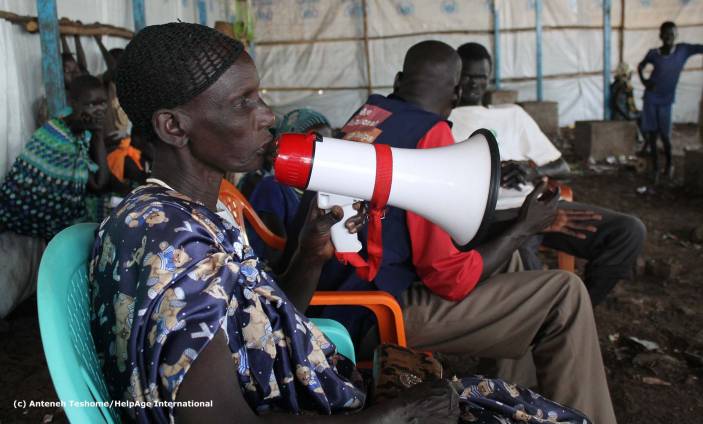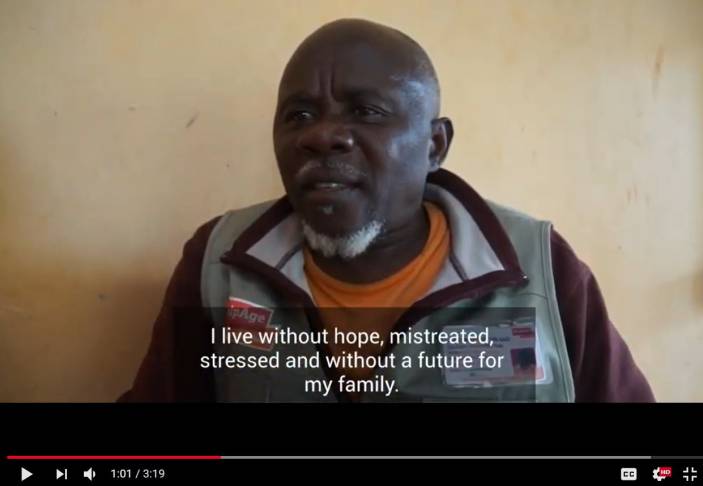
Older refugees face significant challenges when they are displaced. They can be victims of discrimination; their safety is at risk and they often have to overcome barriers to access the support and assistance they need. These risks can be further intensified for women and for those with disabilities.
Older refugees are finding ways to have their voices heard at the local level, but it is important that they are also part of the global debate about refugee policy.
When world leaders, international agencies, NGOs and refugee representatives gathered in Geneva for the Global Refugee Forum (GRF) in December 2019, I went to the Forum to represent HelpAge and ensure that older people were not overlooked in the discussions.
We were waiting to hear what pledges would be made to fulfil the commitments governments had signed up to in the Global Compact on Refugees, agreed a year earlier.
More than 700 pledges were made at the conference, but our initial analysis shows none focussed on the needs of older refugees. The Forum was a good opportunity to raise awareness of the issues that older refugees face, but it was disappointing that governments and other actors failed to make the necessary commitments to protect their rights.
The reality older refugees face
When people flee, families are often separated, and community and support structures are disrupted, making it harder for older people to receive the support they need.
John Vyabagabo, a Burundian refugee, who has fled his home three times and is currently in Tanzania, told his story in this video:
What is more, their roles are often diminished as a result of the loss of community resources and assets caused by their displacement.
Meanwhile, host communities, governments and humanitarian agencies often exclude older people and fail to recognise their roles and capacities.
I had visited refugee camps in Gambella, Ethiopia, one month before the Forum, where I met older refugees and heard about the issues they face.
The humanitarian response in Gambella is severely underfunded and, as difficult decisions are made about how to use limited resources, older refugees are often the ones who lose out. Many suffer from malnutrition, they are also vulnerable to theft and violence and often do not receive the support they need to fix broken and inadequate shelters.
What was inspiring, however, was to see how older people are taking action to ensure their voices are heard.
With support from HelpAge, Older People’s Associations (OPAs) are active in the refugee camps, identifying the issues they face and making sure these are brought to the attention of NGOs and camp authorities. They are also playing an important role in resolving conflict in the camp and with the host community.
Here’s what we can do
The failure of the World Refugee Forum to show any commitment to the rights of refugees, does not mean we should give up. There is still time to call on governments to address the challenges older people in refugee camps are facing.
Older refugees’ experiences inspire support from governments. At the Forum we saw Johanna Sumuvuori, Vice Minister for Foreign Affairs in Finland ask “What about older people? Are services sufficiently inclusive and accessible?”.
We will continue to urge governments and other actors to make pledges and recognise the specific needs of older refugees. We cannot rest until governments express their support, with real commitments to protect older people’s rights.
HelpAge has produced Pledging Guidance documents aimed at governments, international agencies and NGOs. These include example pledges and can be used to secure commitments from your government, and other national actors.
We need to make sure that governments and donors who have a positive attitude towards our cause, influence global actors and hold them to account.
We can help you engage with your government, get in touch at verity.mcgivern@helpage.org.
Together, we can ensure the rights of older refugees are protected.

